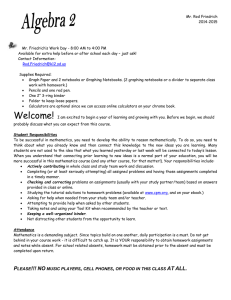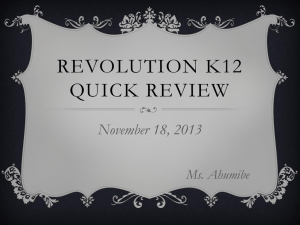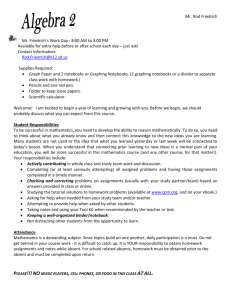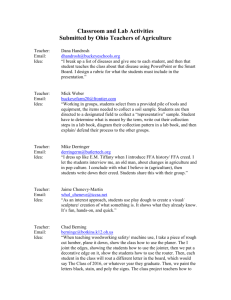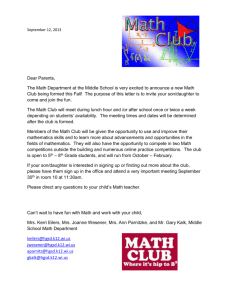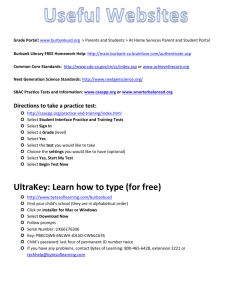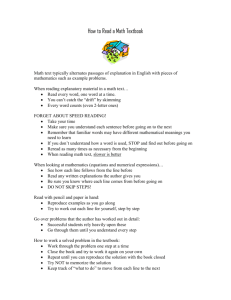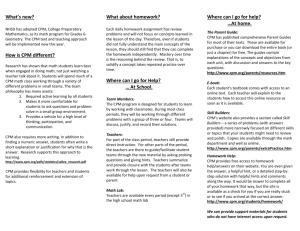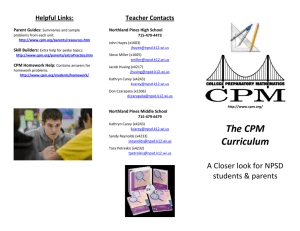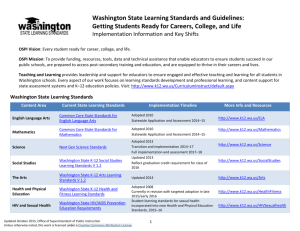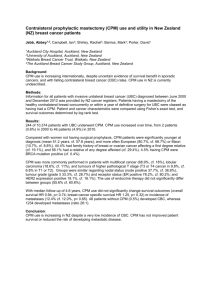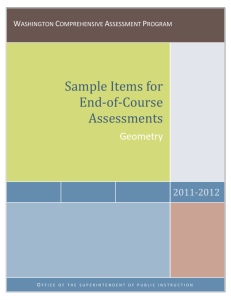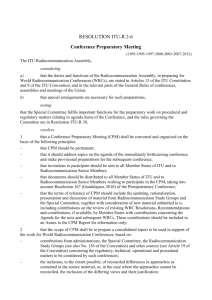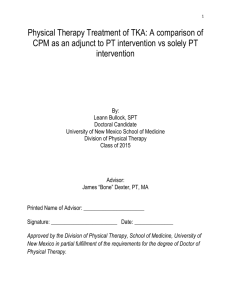CPM Parent Letter 2015-16
advertisement
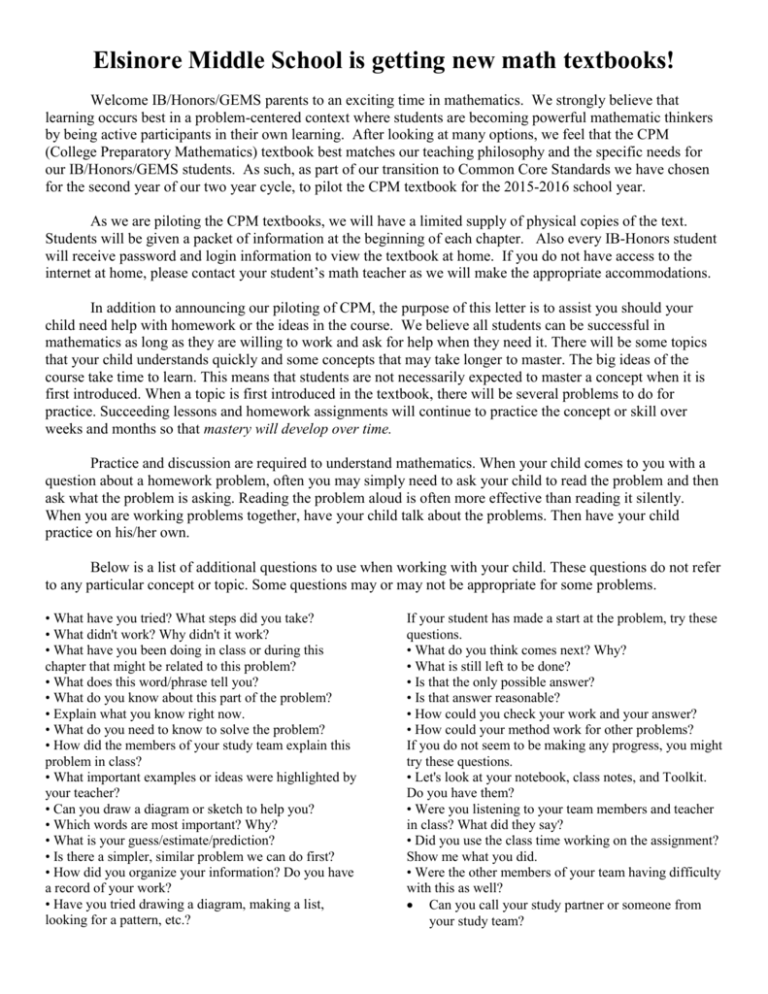
Elsinore Middle School is getting new math textbooks! Welcome IB/Honors/GEMS parents to an exciting time in mathematics. We strongly believe that learning occurs best in a problem-centered context where students are becoming powerful mathematic thinkers by being active participants in their own learning. After looking at many options, we feel that the CPM (College Preparatory Mathematics) textbook best matches our teaching philosophy and the specific needs for our IB/Honors/GEMS students. As such, as part of our transition to Common Core Standards we have chosen for the second year of our two year cycle, to pilot the CPM textbook for the 2015-2016 school year. As we are piloting the CPM textbooks, we will have a limited supply of physical copies of the text. Students will be given a packet of information at the beginning of each chapter. Also every IB-Honors student will receive password and login information to view the textbook at home. If you do not have access to the internet at home, please contact your student’s math teacher as we will make the appropriate accommodations. In addition to announcing our piloting of CPM, the purpose of this letter is to assist you should your child need help with homework or the ideas in the course. We believe all students can be successful in mathematics as long as they are willing to work and ask for help when they need it. There will be some topics that your child understands quickly and some concepts that may take longer to master. The big ideas of the course take time to learn. This means that students are not necessarily expected to master a concept when it is first introduced. When a topic is first introduced in the textbook, there will be several problems to do for practice. Succeeding lessons and homework assignments will continue to practice the concept or skill over weeks and months so that mastery will develop over time. Practice and discussion are required to understand mathematics. When your child comes to you with a question about a homework problem, often you may simply need to ask your child to read the problem and then ask what the problem is asking. Reading the problem aloud is often more effective than reading it silently. When you are working problems together, have your child talk about the problems. Then have your child practice on his/her own. Below is a list of additional questions to use when working with your child. These questions do not refer to any particular concept or topic. Some questions may or may not be appropriate for some problems. • What have you tried? What steps did you take? • What didn't work? Why didn't it work? • What have you been doing in class or during this chapter that might be related to this problem? • What does this word/phrase tell you? • What do you know about this part of the problem? • Explain what you know right now. • What do you need to know to solve the problem? • How did the members of your study team explain this problem in class? • What important examples or ideas were highlighted by your teacher? • Can you draw a diagram or sketch to help you? • Which words are most important? Why? • What is your guess/estimate/prediction? • Is there a simpler, similar problem we can do first? • How did you organize your information? Do you have a record of your work? • Have you tried drawing a diagram, making a list, looking for a pattern, etc.? If your student has made a start at the problem, try these questions. • What do you think comes next? Why? • What is still left to be done? • Is that the only possible answer? • Is that answer reasonable? • How could you check your work and your answer? • How could your method work for other problems? If you do not seem to be making any progress, you might try these questions. • Let's look at your notebook, class notes, and Toolkit. Do you have them? • Were you listening to your team members and teacher in class? What did they say? • Did you use the class time working on the assignment? Show me what you did. • Were the other members of your team having difficulty with this as well? Can you call your study partner or someone from your study team? This is certainly not a complete list; you will probably come up with some of your own questions as you work through the problems with your child. Ask any question at all, even if it seems too simple to you. To be successful in mathematics, students need to develop the ability to reason mathematically. To do so, students need to think about what they already know and then connect this knowledge to the new ideas they are learning. Many students are not used to the idea that what they learned yesterday or last week will be connected to today’s lesson. Too often students do not have to do much thinking in school because they are usually just told what to do. When students understand that connecting prior learning to new ideas is a normal part of their education, they will be more successful in this mathematics course (and any other course, for that matter). The student’s responsibilities for learning mathematics include the following: • Actively contributing in whole class and study team work and discussion. • Completing (or at least attempting) all assigned problems and turning in assignments in a timely manner. • Checking and correcting problems on assignments (usually with their study partner or study team) based on answers and solutions provided in class and online. • Asking for help when needed from his or her study partner, study team, and/or teacher. • Attempting to provide help when asked by other students. • Taking notes and using his/her composition book when recommended by the teacher or the text. • Keeping a well-organized notebook. • Not distracting other students from the opportunity to learn. Assisting your child to understand and accept these responsibilities will help him or her to be successful in this course, developing mathematical reasoning, and form habits that will help her/him become a life-long learner. Additional support for students and parents is provided at the CPM Homework Help site: http://www.cpm.org/students/homework/ user name: password: The website provides a variety of complete solutions, hints, and answers. Some problems refer back to other similar problems. The homework help is designed to assist students to be able to do the problems but not necessarily do the problems for them. If you have any addition questions or concerns please feel to contact your teacher via email or the school phone at 951-674-2118. Elsinore Middle School Math Department Faith Bass Edith Pineda Shamar McKenzie Tisha Scott Ed Bartel Dave Russell Lorraine Johnson Brad Curtis Faith.Bass@leusd.k12.ca.us Edith.Pineda@leusd.k12.ca.us Shamar.McKenzie@leusd.k12.ca.us Tisha.Thomsic@leusd.k12.ca.us Ed.Bartel@leusd.k12.ca.us David.Russell@leusd.k12.ca.us Lorraine.Johnson@leusd.k12.ca.us Brad.Curtis@leusd.k12.ca.us
